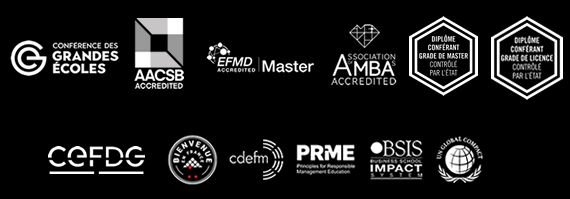EMLV Business School, in collaboration with the De Vinci Research Center (DVRC) initiatives, hosted a thought-provoking roundtable titled “The CSRD (Corporate Sustainability Reporting Directive): Bureaucratic Constraint or Catalyst for Strategic Transformation in Businesses?”
The event, held at the Learning Center in Paris La Défense, brought together a diverse audience of professionals and academics to discuss the implications of the Corporate Sustainability Reporting Directive (CSRD) on businesses’ strategies and practices.
Insights from EMLV’s Roundtable: Exploring the CSRD’s Purpose and Reach
The roundtable featured a distinguished panel of experts who shared their insights and experiences:
- Yves-Alain Ach: Doctor in Management Sciences, Chartered Accountant, Sustainability Auditor, and Head of the Corporate Finance and Audit & Performance Management specializations at EMLV.
- Thuy-Tien Gluck: Head of Corporate Sustainability at HSBC Continental Europe.
- Vincent de Montalivet: Principal and Head of Sustainability Insights & Data North America at Capgemini.
- Isabelle Nicolai: Doctor in Economics and Head of the MBA in CSR Management and Organisational Performance at De Vinci Executive Education.
The session was moderated by Moez Essid, Doctor in Management Sciences and Head of the Finance & Management Control specialization at EMLV.
Moez Essid, Head of the Finance & Management Control Specialization at EMLV, opened the event by providing a comprehensive overview of the CSRD. He outlined its origins within the European Green Deal and its objectives to harmonise ESG (Environmental, Social, and Governance) reporting across Europe.
Key points highlighted included:
- The CSRD replaces the Non-Financial Reporting Directive (NFRD) and introduces the concept of double materiality.
- It aims to elevate ESG reporting to the same standard as financial reporting by mandating standardised, audited disclosures.
The Preparedness of European Businesses
Thuy-Tien Gluck, Head of Corporate Sustainability at HSBC Continental Europe, discussed the varying readiness levels among European companies.
She shared examples of effective practices adopted by leading organisations and addressed the unique challenges SMEs face in adapting to the directive.
Participants engaged in a lively debate on the pace of change and the potential need for phased implementation to allow businesses sufficient time to comply.
CSRD: Constraint or Catalyst?
Vincent de Montalivet, Principal and Head of Sustainability Insights & Data North America at Capgemini, offered a nuanced perspective on the CSRD. While acknowledging the directive’s administrative demands, he emphasised its potential to drive innovation and strengthen competitive advantage.
Key themes included:
- Transforming regulatory obligations into strategic opportunities.
- Using double materiality to align ESG priorities with business goals.
- The connection between strong ESG performance and long-term financial success.
The Role of Auditors in CSRD Reporting
Yves-Alain Ach, Doctor in Management Sciences and Head of Corporate Finance and Audit Specializations at EMLV explored the evolving role of auditors in sustainability reporting.
He underscored the importance of specialised expertise in sustainability audits, which differ significantly from traditional financial audits. He also emphasised the need for auditors to support businesses in meeting the directive’s complex requirements.
Developing Skills for CSRD Compliance
Isabelle Nicolai, Professor and Head of the MBA in Executive CSR, closed the discussion by addressing the critical need for education and training. She identified key competencies businesses must develop, such as understanding double materiality and value chain analysis.
She also highlighted the role of higher education in preparing future professionals to navigate sustainability reporting challenges effectively.
EMLV’s Roundtable Event Outcomes and Reflections
The roundtable, which included business leaders, auditors, consultants, and researchers, attracted 30 participants. Discussions emphasised the CSRD’s transformative potential, which, while demanding, offers an opportunity to rethink corporate sustainability practices.
Attendees left with actionable insights on navigating and leveraging the directive’s requirements for strategic advantage. The event reaffirmed EMLV’s commitment to fostering dialogue and collaboration on critical issues shaping the future of business and sustainability.
Stay tuned for more events hosted by EMLV Business School as we continue to explore the intersection of education, research, and industry challenges.





















